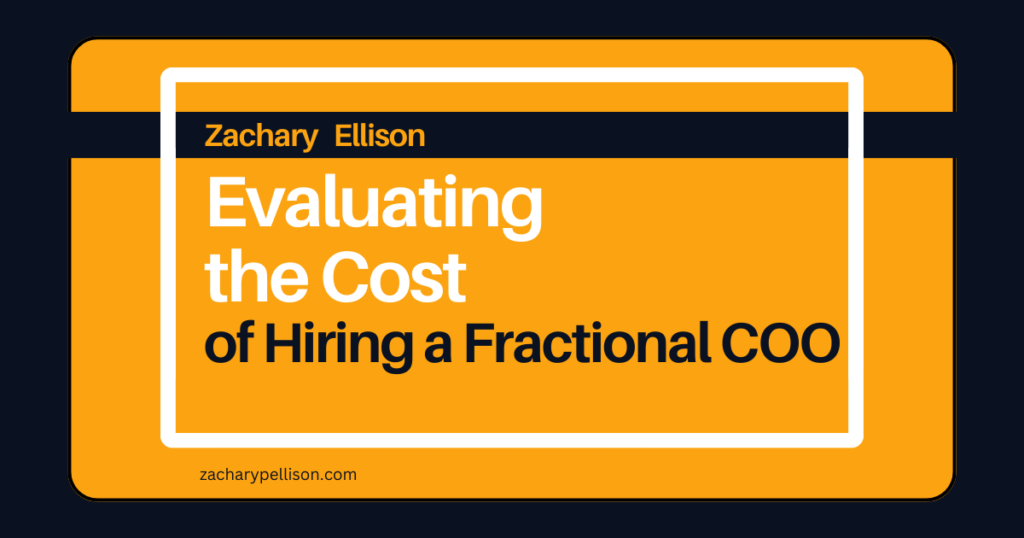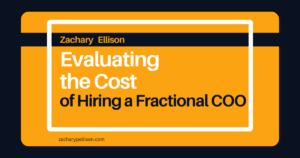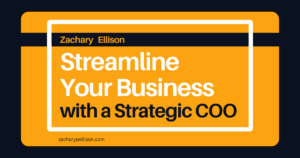Cost of Hiring a Fractional COO: Is it Worth the Investment?

What is the average cost of hiring a fractional COO?
The average cost of hiring a fractional COO can vary depending on a variety of factors such as industry, company size, and scope of responsibilities.
However, on average, businesses can expect to pay anywhere between $5,000 to $15,000 per month for a fractional COO’s services.
In today’s fast-paced business world, companies are constantly looking for ways to improve their operations and stay ahead of the competition. One strategic move that many business owners consider is hiring a fractional Chief Operating Officer (COO).
But what exactly is a fractional COO and is the cost worth the investment?
In this blog post, we will explore the role of a fractional COO, the unique skillset they bring to the table, the key responsibilities they undertake, the factors affecting the cost of hiring one, and ultimately, how to determine if the investment in a fractional COO was worth it.
Understanding the Role of a Fractional COO
When it comes to the role of a fractional COO, it’s important to understand the broader context of a Chief Operating Officer (COO).
A fractional COO, as the term suggests, is a part-time executive who provides operational leadership and strategic guidance to businesses on a fractional basis, meaning they work only for the time needed.
Fractional COOs have experience in various industries and play a crucial role in developing and implementing business strategies, driving operational efficiency, and guiding the leadership team towards success.
The Need for a Fractional COO in Today’s Business Environment
In the rapidly changing business landscape, the need for a fractional COO has become increasingly prevalent. With the complexities of business operations and the growing demands of project management, companies can benefit from the expertise of fractional executives.
Fractional COOs bring years of experience and strategic planning capabilities, helping businesses navigate challenges, streamline operations, and achieve their goals.
These fractional executives act as change agents, capable of assessing the business’s needs, driving strategic planning, and implementing process improvement initiatives.
By working alongside the existing team members, fractional COOs ensure that the business is operating optimally, maximizing efficiency, and responding to the dynamic market environment.
The Unique Skillset and Knowledge of a Fractional COO
What sets fractional COOs apart is their unique skillset and knowledge, gained through years of experience in various industries.
These executives bring a fresh perspective to the leadership team, offering insights and best practices that can drive process improvements and operational efficiency.
With their in-depth understanding of business operations, fractional COOs can identify opportunities for growth, develop actionable plans, and implement strategic initiatives.
Their broad range of experience allows them to see the bigger picture and make informed decisions that align with the business strategy.
By leveraging their expertise, companies can benefit from the leadership of fractional COOs, ensuring the business is operating at its full potential.
The Need for a Fractional COO in Today’s Business Environment
In today’s business environment, experienced COOs offer a unique skill set that aligns with the company’s strategy.
Companies can benefit from fractional chief operating officer’s expertise on a full day or a fraction of the time, aiding in change management and strategic decision-making.
Their involvement provides a new perspective for the development of actionable business plans and navigating various factors, driving operational efficiency for a growing business.
This approach offers different ways to tackle daily operations while leveraging the skills of an experienced COO.
The Unique Skillset and Knowledge of a Fractional COO
With a wealth of experience, an experienced fractional COO seamlessly integrates operational efficiency into daily business operations.
Functioning as a fractional chief operating officer, they bring a broader perspective to business management, offering insights that drive strategic planning and product development.
Small businesses can tap into tailored financial models, allowing them to access the expertise of a chief executive officer on a fraction of a full day’s average salary.
Engaging a fractional COO is pivotal for growing businesses looking to innovate and streamline operations in different ways.
Key Responsibilities of a Fractional COO

The responsibilities of a fractional COO are diverse, encompassing a range of key areas within the business.
Working closely with the business owner, fractional COOs provide support in various capacities.
They assist in team development, ensuring the right talent is in place, optimizing human resources, and driving a positive team culture. Additionally, fractional COOs contribute to strategic planning, business development, and process improvement.
Their role is crucial in aligning the business strategy with operational practices, fostering growth, and maximizing the business’s potential.
Factors affecting the cost of a fractional COO
When considering the cost of hiring a fractional COO, several factors come into play, impacting the overall investment.
Here are some factors that affect the cost of a fractional COO:
- Fractional COO rates: The rates charged by fractional COOs can vary based on their experience, expertise, and the specific services they provide.
- Hourly basis: Some fractional COOs charge on an hourly basis, where the business owner pays for the time spent on their business operations.
- Monthly retainer: Others may work on a monthly retainer, providing ongoing support and availability for the business.
- Salary range: The salary range of fractional COOs can vary depending on factors such as the business size, industry, and level of support required.
Ultimately, the cost of hiring a fractional COO will depend on the specific needs of the business, the level of support desired, and the financial models in place.
It is essential to consider the potential return on investment (ROI) when evaluating the cost of hiring a fractional COO.
Comparing the cost with the benefits derived
While the cost of hiring a fractional COO may be a significant consideration, it’s important to weigh that against the benefits derived from their services.
Here are some key benefits of hiring a fractional COO:
- Improved bottom line: Fractional COOs can help optimize business operations, leading to increased revenue and profitability.
- Enhanced cash flow: By streamlining processes, managing resources effectively, and implementing best practices, fractional COOs can improve cash flow management.
- Operational efficiency: Fractional COOs bring operational leadership, strategic planning, and process improvement expertise, driving efficiency throughout the organization.
- Return on investment (ROI): The value added by a fractional COO can directly impact the business’s ROI, making the investment worthwhile.
When considering the cost of hiring a fractional COO, it is crucial to assess the potential benefits and the long-term impact they can have on the business’s bottom line, cash flow, and operational efficiency.
By weighing the cost against the benefits, business owners can make an informed decision about the value of hiring a fractional COO.
Delving into the Cost of Hiring a Fractional COO

Understanding the financial implications of engaging an experienced COO to oversee the daily operations of a growing business is crucial.
A fractional Chief Operating Officer, working just a fraction of the time a full-time Chief Executive Officer would, can provide significant strategic value.
Considering the average salary of a COO and the different ways their expertise can optimize processes and drive efficiency, it’s essential to evaluate the cost vis-à-vis the benefits derived.
By investing in a fractional COO, businesses can achieve sustainable growth and innovation without the expense of a full-time hire.
Factors affecting the cost of a fractional COO
Experienced fraction of the time execs, like a fractional Chief Operating Officer (COO), offer valuable expertise to growing businesses.
Their average salary varies based on business size and operational needs, impacting daily operations.
For different ways of engagement, businesses may opt for hourly rates or monthly retainers, considering cash flow and efficiency improvements.
The level of support and team dynamics also play a crucial role in determining the cost, making it an investment in business strategy and growth.
Comparing the cost with the benefits derived
Engaging an experienced fractional chief operating officer (COO) yields significant advantages for a growing business.
Their impact on daily operations and strategic guidance justifies the investment, positively influencing the bottom line and cash flow. Fractional COOs bring a fraction of the time commitment of a full-time chief executive officer (CEO) at a fraction of the average salary.
Their contribution drives operational efficiency and innovative business strategies, offering different ways to enhance overall performance.
Identifying the Ideal Time to Hire a Fractional COO

Knowing when to hire a fractional COO is crucial for business growth and management. The ideal time to bring in a fractional COO depends on various factors, including the business’s growth stage, management needs, and operational dynamics.
Here are some key considerations when identifying the ideal time to hire a fractional COO:
- Change agent needs: If the business requires a change agent to drive strategic initiatives and process improvement, a fractional COO can provide the right expertise.
- Right person involvement: Strategic decision-making requires the right person with the experience and leadership necessary for the business’s growth.
- Full team member support: Fractional COOs can provide the benefits of a full team member without the financial commitment of a full-time executive.
- Actionable plan development: When the business needs fresh perspective, actionable business plans, and guidance in implementing strategies, fractional COOs can offer invaluable support.
Decision-making based on business size and growth
When deciding to hire a fractional COO, business owners should consider their company’s size, growth trajectory, and operational needs.
Here are some factors to consider:
- Business size: Smaller companies may benefit from the operational leadership and strategic support fractional COOs can provide.
- Level of support: Assessing the level of support needed for business growth can guide the decision to hire a fractional COO.
- Product development: Fractional COOs can bring valuable expertise in product development, aiding business expansion.
- New tools and resources: When the business requires the implementation of new tools and resources, fractional COOs can provide the guidance necessary for success.
By considering these factors, business owners can make an informed decision about the right time to hire a fractional COO, ensuring the business is positioned for growth and success.
Recognizing the signs your business needs a fractional COO
Recognizing the indications that your business requires a fractional Chief Operating Officer involves assessing the need for strategic planning, operational leadership, and process enhancement.
Limited time, the requirement for a change agent, and the necessity for operational efficiency are clear signs that engaging an experienced COO on a fraction of the time may be beneficial.
Additionally, recognizing the signs of operational inefficiency, the need for strategic support, or human resources improvement indicates the ideal time to consider bringing in a fractional COO to support your growing business.
Decision-making based on business size and growth
When considering fractional COO services, business owners base their decisions on factors such as business size, operational efficiency, and growth.
They assess the need for support, team dynamics, and financial models before engaging a fractional COO, who provides cost-effective leadership and business strategy for smaller companies.
The decision to hire a fractional COO involves evaluating operational needs, strategic planning, and human resources requirements. Ultimately, businesses seek experienced leadership and fresh perspectives to optimize daily operations and drive growth.
Leveraging a Fractional COO for Business Efficiency and Innovation

Employing the services of a fractional COO can be a great way for businesses to leverage fresh perspectives and experienced leadership.
By collaborating with the executive team, fractional COOs ensure daily operations are running efficiently while also providing strategic insight for business improvement.
They bring a wealth of experience and knowledge to the table, offering innovative solutions and guiding the business towards success.
Case studies of businesses benefitting from a fractional COO
Numerous businesses have experienced tremendous benefits from hiring a fractional COO. Let’s explore some case studies that highlight the positive impact of fractional executives across various industries:
Case Study 1: Company A, an e-commerce startup, was struggling with operational efficiency and strategic planning.
By hiring a fractional COO with a broad range of experience, the company was able to develop a comprehensive business strategy, streamline operations, and drive significant revenue growth.
The fractional COO brought fresh perspective and a bigger picture approach, resulting in success for the business.
Case Study 2: Company B, a manufacturing company, was facing challenges in team development and process improvement.
By engaging the services of an experienced fractional COO, the business experienced improved team dynamics, better leadership, and enhanced operational efficiency.
The fractional COO implemented best practices, resulting in reduced costs, increased productivity, and improved product quality.
Case Study 3: Company C, a technology startup, needed strategic planning and product development expertise.
By hiring a fractional COO, the business was able to navigate the complexities of the industry, identify market opportunities, and successfully launch new products.
The fractional COO’s guidance and experience played a pivotal role in the business’s growth and success.
These case studies demonstrate the broad range of experience fractional COOs bring to the table, their ability to see the bigger picture, and their impact on business operations.
The success stories of these businesses serve as a testament to the value and benefit of hiring a fractional COO.
Ensuring a successful engagement with an experienced fractional COO
To ensure a successful engagement with an experienced fractional COO, there are several factors to consider.
Here are some best practices:
- Clearly define expectations: Clearly communicate the business’s objectives, expectations, and desired outcomes to the fractional COO.
- Establish regular communication: Maintain open lines of communication with the fractional COO, providing updates and addressing any concerns or questions.
- Foster positive team dynamics: Encourage collaboration and create an environment where the fractional COO can seamlessly integrate with the existing team.
- Utilize the fractional COO’s limited time effectively: Make the most of the time the fractional COO spends with the business by prioritizing high-impact initiatives and projects.
- Implement best practices: Take advantage of the fractional COO’s experience and knowledge by implementing best practices, process improvement strategies, and operational efficiencies.
By following these best practices, business owners can ensure a successful engagement with an experienced fractional COO, maximizing the value they bring to the business.
Case studies of businesses benefitting from a fractional COO
In case studies of businesses benefiting from a fractional COO, experienced COOs have contributed to increased efficiency and profitability, introducing fresh perspective and strategic planning.
Significant enhancements in team development and operational leadership have been observed, along with successful process improvement.
Business owners have witnessed the positive impact of fractional COOs on their bottom line, demonstrating the value of their expertise in driving growth and innovation within different business operations.
Ensuring a successful engagement with an experienced fractional COO
Experienced fractional COOs offer a wealth of strategic business expertise, driving actionable plans and operational efficiency.
Their support extends to ongoing product development and long-term business benefit, acting as change agents within the organization.
Businesses, particularly smaller ones, find that engaging a fractional COO provides access to full team dynamics, despite only having a fraction of the time commitment.
This unique dynamic enhances daily operations, benefiting growing businesses in different ways.
How can a business decide if the investment in a Fractional COO was worth it?

Determining the worth of the investment in a fractional COO requires careful evaluation of the impact theO has had on the business.
Here are some factors to consider:
- The fit: Evaluate if the fractional COO was the right fit for business’s needs, culture, and strategic goals.
- Measure the full day: Consider the fractional COO’s contribution to the business’s day-to operations, strategic planning, and team development.
- Evaluate the longer-term results: Assess the long-term impact of the fractional COO’s involvement in the, considering the financial, operational, and strategic improvements.
- Examine financial: Compare the financial models before and after the fractional COO’s engagement, considering factors such as revenue growth, cost reduction, and profitability.
- By considering these factors, business owners can make an informed decision about the worth of the investment in a fractional COO, ensuring the business is positioned for long-term success15.
In today’s business environment, the role of a fractional COO has become increasingly vital for companies looking to drive operational efficiency, maximize growth, and navigate the complexities of the market.
With their unique skillset, broad experience, and fresh perspective, fractional COOs play a critical role in strategic planning, process improvement, team development, and business leadership.
While the cost of hiring a fractional COO may initially be a concern, the benefits derived, such as improved bottom line, cash flow, and operational efficiency, often outweigh the investment.
By carefully assessing the business’s needs, evaluating the potential ROI, and considering the long-term impact, business owners can make an informed decision about the worth of hiring a fractional COO.
Ultimately, the right fractional COO can bring invaluable expertise, drive success, and position the business for growth in today’s competitive landscape.
Frequently Asked Questions
What are the responsibilities of a fractional COO?
Responsibilities of a fractional COO include overseeing daily operations, developing strategies for efficiency and profitability, managing employees and budgets, and utilizing expertise at a lower cost than a full-time COO.
How does hiring a fractional COO differ from hiring a full-time COO?
When it comes to hiring a fractional COO, there are several key differences compared to hiring a full-time COO. One major distinction is the cost structure – with a fractional COO, you only pay for the time and services you need, avoiding the expense of a full-time salary.
Additionally, fractional COOs often work remotely and are available on an as-needed basis, whereas full-time COOs may require additional benefits and office space. This makes hiring a fractional COO a cost-effective solution for businesses that don’t require a full-time executive.
What factors should be considered when determining the cost of a fractional COO?
Factors to consider when determining the cost of a fractional COO include their level of experience and expertise, the size and complexity of the company, the time commitment required, and the specific responsibilities expected.
What are the potential benefits and ROI of hiring a fractional COO for my business?
A fractional COO can bring expertise and strategic guidance to your business, optimizing operations and reducing costs. This cost-effective alternative to a full-time COO can lead to increased revenue, improved profitability, and better decision-making.
Conclusion
In conclusion, hiring a fractional COO can be a valuable investment for your business.
Their unique skillset and knowledge can bring efficiency, innovation, and strategic decision-making to your organization.
While the cost of a fractional COO may vary based on factors such as business size and industry, it is important to consider the benefits and ROI derived from their expertise.
Many businesses have experienced significant improvements in operations and growth through their engagement with a fractional COO. If you are considering hiring a fractional COO, take the time to assess your business’s needs and recognize the signs that indicate the right time for this strategic addition.
To explore the cost and benefits further, request quotes from experienced fractional COOs to make an informed decision for your business’s success.





